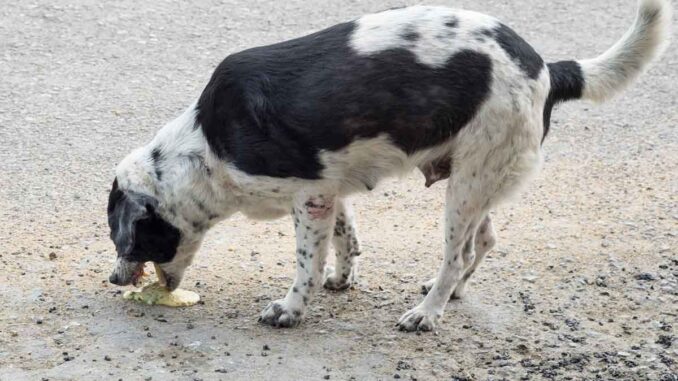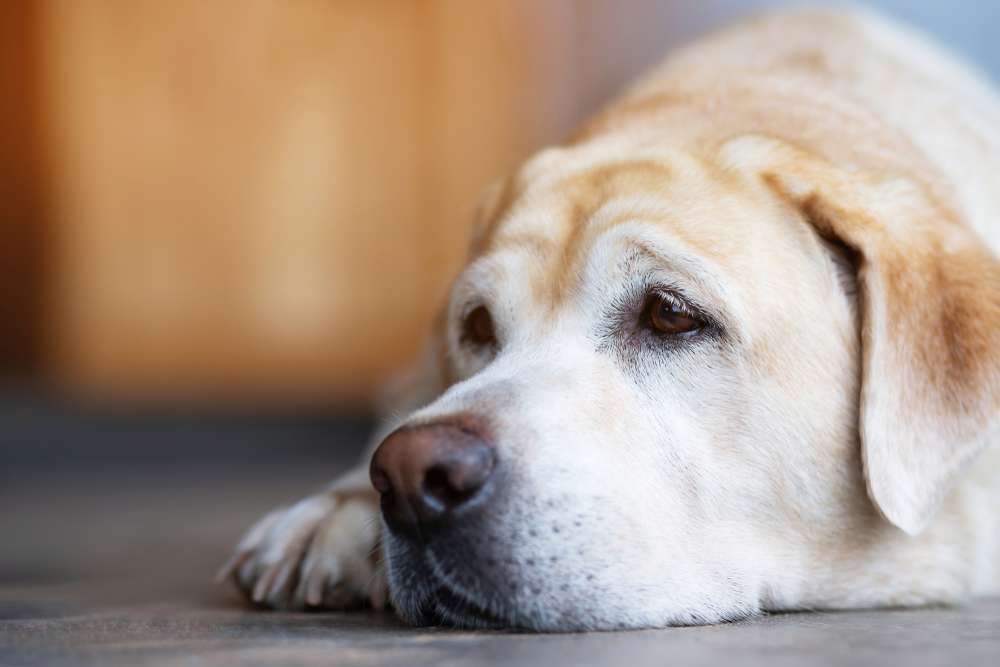
This article was updated on April 18th, 2023
In our veterinarian clinic, it is typical for me to see at least 2 to 3 owners each day whose dog is vomiting or has diarrhea. Vomiting and diarrhea are very common reasons that your dog may need to see a vet.
At some time during your dog’s life, your dog is bound to get sick, vomit or have diarrhea. Many times this is because your dog ate something that they should not have. This leads to gastroenteritis or pancreatitis.
The most frequent causes of vomiting and diarrhea in dogs
A retrospective study in the Journal of Veterinary Internal Medicine found that the most common causes of chronic diarrhea in dogs were due to dogs eating things that they should not.
These are some other reasons that your dog may be vomiting or having diarrhea:
- Gastroenteritis: gastroenteritis is an infection in your dog’s intestines. This can be caused by a bacterial overgrowth leading to inflammation and vomiting and diarrhea. You can try some of the tips and tricks below to help with mild cases at home.
- Pancreatitis: Dogs who eat fatty foods or human foods can develop pancreatitis. This is an inflammation of the pancreas. This often causes your dog to vomit, have diarrhea and be very painful in their abdomen.
- Foreign body Obstruction: Puppies are known for eating things that they should not. This includes socks, underwear and toys. Many times these are too big to pass through your dog’s intestines. If they get stuck along the way through your dog may start vomiting and having diarrhea.
- Parvo Virus: In puppies who have not been vaccinated, parvo virus is very common. These dogs have bloody diarrhea and will vomit. Without treatment, many of these puppies will die. If your puppy is having bloody diarrhea, it would be best to see your vet right away for a parvo test and treatment.
4 proven tips for when your dog is vomiting or has diarrhea
If your dog is vomiting and having diarrhea, these are some things that you can do at home to help treat this.
1. Withhold food for 6 hours: If your dog ate something that they should not have eaten, often withholding food for 6 hours will allow their stomach to calm down.
2. Offer a bland diet: Many dogs are vomiting and having diarrhea because they ate food that did not settle with their stomach. Offering them a bland diet for a few days will help calm their stomachs. This bland diet will be very easy to digest and usually consists of boiled chicken, white rice, and a scrambled egg.
3. Try over-the-counter medications: In mild vomiting and diarrhea cases, you can offer over-the-counter medications. Things such as Immodium or Pepto are generally safe to give to your dog to help calm their stomach and stop them from having diarrhea:
Please note that you should always consult with your veterinarian before giving any new medication to your dog.
4. Give your dog probiotics: Most gastrointestinal diseases can cause an overgrowth of bad bacteria. Probiotics will replace the good bacteria that is found in your dog’s intestine and may stop their diarrhea and vomiting.
When to visit your veterinarian

Many times when your dog is vomiting and having diarrhea you may wonder if this can be treated with just at-home treatments or is this an emergency that should see a vet right away. This is an easy way to determine how urgent your pet needs to see your vet.
Signs you can treat your dog at home first: When your dog is still active and has only had one episode of vomiting or diarrhea you can try at-home treatment first.
Signs you need to see a vet (office hours): If your dog continues to vomit and has diarrhea for more than 1 day or more than 5 times in 12 hours your dog needs to go see their vet. If your dog is still active and still interested in eating and drinking this can often wait until office hours
Signs you need to go to vet emergencies: Sometimes vomiting and diarrhea can be an emergency. These are some signs that you need to go to the emergency vet right away:
- Vomiting for more than 24 hours
- Vomiting or having diarrhea more than 5 times in one day
- Bloody vomit or diarrhea
- Pale or blue gums
- Extremely lethargic and unresponsive
These cases will need quick medical intervention by your veterinarian for your dog to fully recover.
Veterinary treatment of vomiting and diarrhea
Depending on how severe your dog’s symptoms are, your vet will perform a physical exam, run bloodwork, take x-rays or ultrasound, check a fecal sample for parasites or run other tests.
What is the prognosis for gastroenteritis?
Dogs with gastroenteritis will often quickly recover with medication. If your dog is severely dehydrated, they will need to stay in the veterinary hospital on IV fluids to recover. Many dogs with gastroenteritis may also have other issues that would make their prognosis not as good.
Cost of treatments for vomiting and diarrhea
The cost of treatment will vary depending on where you live and if your dog is at the emergency vet or your regular vet office. For testing and at-home treatment, you can expect to spend $400 to $500 where if they need to stay overnight in intensive care or had to see the emergency vet expect to pay $1500+ for their care.
You can ask your vet for a breakdown of cost and an estimate of their overall stay before proceeding with treatment. Many vet offices have payment options to help with medical expenses.
More tips to prevent diarrhea and vomiting from re-occurring
Many times vomiting and diarrhea can easily be prevented. These are a few things that can help prevent vomiting and diarrhea in dogs.
- Do not feed table scraps.
- Make sure your dog cannot get into any chemicals.
- Take away any toys that your dog destroys.
- Make sure your dog is fully vaccinated before taking them to dog parks.
- Make sure your dog is dewormed frequently.
- Slowly change foods over 3 to 5 days.
Frequently Asked Questions
What medicine can I give my dog for vomiting and diarrhea?
There are not many over-the-counter medications but you can give your dog Imodium or Pepto Bismol for vomiting and diarrhea. Before starting any new medications it is best to talk to your vet. They can also give you the proper dosage for your dog’s size.
For Immodium, a good dosage to follow is:
- Small dogs (Under 25 pounds): 1/4th tablets a day
- Medium dogs (30 to 60 pounds): ½ tablet a day
- Large dogs (over 80 pounds): 1 tablet a day
How do you treat a senior dog for diarrhea and vomiting?
Older dogs who are vomiting and having diarrhea need to be monitored very closely. For certain types of cancer vomiting and diarrhea are the first signs that you may notice. These dogs also do not recover as quickly from these issues and may need to see your vet sooner to help them fully recover.
How do you treat a puppy for diarrhea and vomiting?
Puppies are known for eating things, having parvo virus and parasites. These three things can all cause your puppy to vomit and have diarrhea. Puppies are more susceptible to disease and do not recover as quickly as adult dogs since their immune system is not as developed. If your puppy continues to vomit and has diarrhea, especially bloody diarrhea, it is best for your puppy to see your vet.
3 examples of dogs vomiting and having diarrhea (with veterinarian diagnosis)
Example 1: My dog has thrown up about once yesterday and once today. He now has diarrhea but is drinking, eating, and acting normal. What does this mean and what should I do?
Vet answer: Some dogs will have mild Gastrointestinal issues and only cause them to vomit once a day. It would be best to offer them a bland diet for a few days to see if this helps. As long as your dog is eating, drinking, and acting normal, you can monitor them at home for signs of improvement.
Example 2: My 2-year-old lab had diarrhea yesterday but normal poop today. Today he started having diarrhea again and also vomited once. What does this mean and what should I do?
Vet answer: Many young labs are known for eating things that they should not such as socks and toys. A bland diet and probiotics will help calm his stomach. If he continues vomiting, it would be best that your vet takes an x-ray to make sure that there is not a blockage causing these issues.
Example 3: My 10-week-old puppy is vomiting and having bloody diarrhea. His is still interested in food and water. What does this mean and what should I do?
Vet answer: This could be parvo virus that is causing your puppy to be sick. Make sure that your puppy stays fully hydrated and offer them a bland diet. Parasites can also cause puppies to have bloody stool so having your puppy dewormed to get rid of any parasites can help firm up their stool.
Related Posts about Dogs Vomiting Issues:
 Dog Vomiting Blood: Our Veterinarians Explain What to Do - Seeing your dog vomit is upsetting enough, but vomiting blood can be downright scary. So what are the possible reasons… [...]
Dog Vomiting Blood: Our Veterinarians Explain What to Do - Seeing your dog vomit is upsetting enough, but vomiting blood can be downright scary. So what are the possible reasons… [...] Dog Vomiting Blood but Acting Normal: Top Reasons and Solutions - A dog who vomits blood is enough to set off alarm bells in your head. Sure, dogs vomit all the… [...]
Dog Vomiting Blood but Acting Normal: Top Reasons and Solutions - A dog who vomits blood is enough to set off alarm bells in your head. Sure, dogs vomit all the… [...] My Dog is Vomiting but Acting Normal: What Could it be? - Dogs vomit for all sorts of reasons. As their loving owners, we naturally become concerned and want to find out… [...]
My Dog is Vomiting but Acting Normal: What Could it be? - Dogs vomit for all sorts of reasons. As their loving owners, we naturally become concerned and want to find out… [...] 3 Home Remedies for a Dog Vomiting White Foam [Vet Advice] - Any time your dog vomits, it may cause your stomach to turn a little with worry and concern. When your… [...]
3 Home Remedies for a Dog Vomiting White Foam [Vet Advice] - Any time your dog vomits, it may cause your stomach to turn a little with worry and concern. When your… [...] Why Dogs Throw Up Undigested Food [with 7 Tips from a Vet] - Doggy vomit. It’s an affliction any dog parent is only too aware of. However, did you know that when it… [...]
Why Dogs Throw Up Undigested Food [with 7 Tips from a Vet] - Doggy vomit. It’s an affliction any dog parent is only too aware of. However, did you know that when it… [...] What Should I Do if My Old Dog Vomits [3 Tips from a Vet] - Vomiting is a symptom that always causes concern amongst owners, and for good reason. While vomiting can be a sign… [...]
What Should I Do if My Old Dog Vomits [3 Tips from a Vet] - Vomiting is a symptom that always causes concern amongst owners, and for good reason. While vomiting can be a sign… [...]Disclaimer: This website's content is not a substitute for veterinary care. Always consult with your veterinarian for healthcare decisions. Read More.








Be the first to comment